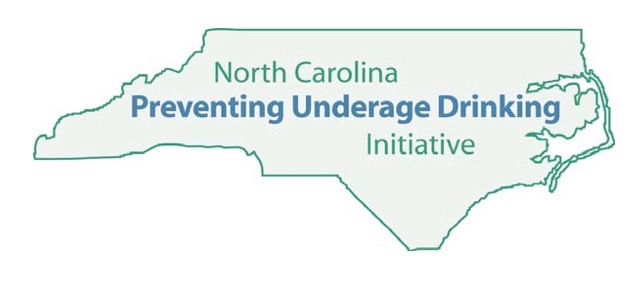The North Carolina Preventing Underage Drinking Initiative (NC-PUDi) focuses on community-based approaches emphasizing environmental strategies to prevent underage drinking. As the congressional National Academy of Sciences (NAS)/ Institute of Medicine (IOM) report, Reducing Underage Drinking: A Collective Responsibility states:
The committee reached the fundamental conclusion that underage drinking cannot be addressed by focusing on youth alone. Youth drink within the context of a society in which alcohol is normative behavior and images about alcohol are pervasive. They usually obtain alcohol – either directly or indirectly – from adults. Efforts to reduce underage drinking, therefore need to focus on adults and must engage the society at large.
— National Academy of Sciences/Institute of Medicine Report, Reducing Underage Drinking: A Collective Responsibility, 2003
The Initiative Supports the Following:
- The development and execution of a strategic state plan including short- and long-term goals for preventing and reducing underage drinking in North Carolina;
- The funding, training, technical assistance, and monitoring of community collaboratives that are implementing environmental management strategies to prevent and reduce underage alcohol use in their communities;
- The implementation of Media Ready, an evidence-based media literacy program for 6th to 8th grade youth, designed to delay or prevent substance use, particularly with respect to underage drinking.
 The North Carolina Preventing Underage Drinking Initiative offers technical assistance to communities addressing the issue of underage alcohol use, but the primary focus of the Initiative is in supporting funded community organizations. These collaboratives work within their communities to implement environmental management strategies designed to prevent underage drinking, and create a sustainable movement to stop practices that make underage drinking both easy and acceptable. The strategies utilized focus on the following:
The North Carolina Preventing Underage Drinking Initiative offers technical assistance to communities addressing the issue of underage alcohol use, but the primary focus of the Initiative is in supporting funded community organizations. These collaboratives work within their communities to implement environmental management strategies designed to prevent underage drinking, and create a sustainable movement to stop practices that make underage drinking both easy and acceptable. The strategies utilized focus on the following:
The NC-PUDi is an important component of the work and mission of the North Carolina Division of Mental Health, Developmental Disabilities, and Substance Abuse Services (NC DMHDDSAS) which states:
North Carolina will provide people with, or at risk of, mental illness, developmental disabilities and substance abuse problems and their families the necessary prevention, intervention, treatment, services and supports they need to live successfully in communities of their choice.
In keeping with this guiding mission, the NC-PUDi:
- Supports the efforts of community collaboratives to use community-based approaches emphasizing proven, measurable environmental management strategies to prevent underage alcohol use, and
- Provides technical assistance and education to increase the skills and knowledge-base of NC citizens in their efforts to prevent underage drinking.
The North Carolina Preventing Underage Drinking Initiative offers technical assistance to communities addressing the issue of underage alcohol use, but the primary focus of the Initiative is in supporting communities funded under the Enforcing Underage Drinking Laws (EUDL) Program. These collaboratives work within their communities to implement environmental management strategies designed to prevent underage drinking, and create a sustainable movement to stop practices that make underage drinking both easy and acceptable. The strategies utilized focus on the following:
- Decreasing underage access to alcohol;
- Changing community norms that promote underage and high-risk alcohol consumption; and
- Addressing policies pertaining to underage drinking.
Environmental management is based on the fact that people’s behavior, including their use of substances, is powerfully shaped by their environment, including the messages and images delivered by the mass media, the norms of their communities and other social groups, the availability of substances, and so forth. Thus, effective prevention requires appropriately modifying the physical, legal, economic, and socio-cultural processes of the community at large that contribute to substance abuse and related problems (Holder, 1999). By targeting environmental factors, this approach to prevention differs from more traditional, individually oriented strategies, which tend to accept the environment and the risks it imposes as given and instead focus on enhancing individuals’ abilities to resist its temptations.
Prevention directed at the environment generally relies on public policies (e.g., laws, rules, regulations) and other community-level interventions both to limit access to substances and to alter the culture and contexts within which decisions about substance use are made. Because environmental management affects whole populations and creates changes in the fundamental system wide processes underlying substance abuse, it can potentially bring about relatively quick, dramatic, and enduring reductions in substance abuse problems. Prevention efforts conducted in communities have incorporated an increasing number of environmental management strategies, and a body of research has accumulated showing that these strategies can be effective (for reviews of this literature, see Alcohol Research and Social Policy, 1996; Edwards et al., 1994; Holder, 1999; Holder et. al, 2000; Stewart, 1997; Streicker, 2000; Toomey and Wagenaar, 2002b).
Environmental Management Strategies to Prevent Alcohol Problems on College Campuses
Pacific Institute for Research and Evaluation, Revised 2006
Priority environmental management strategies utilized by the collaboratives include, but are not limited to:
- Alcohol Purchase Surveys
- Collaboration with Law Enforcement
- Media Advocacy
- Media Literacy
- Safe Homes
- Youth Advocacy
- Policy Advocacy
- Talk It Up. Lock It Up! ™
